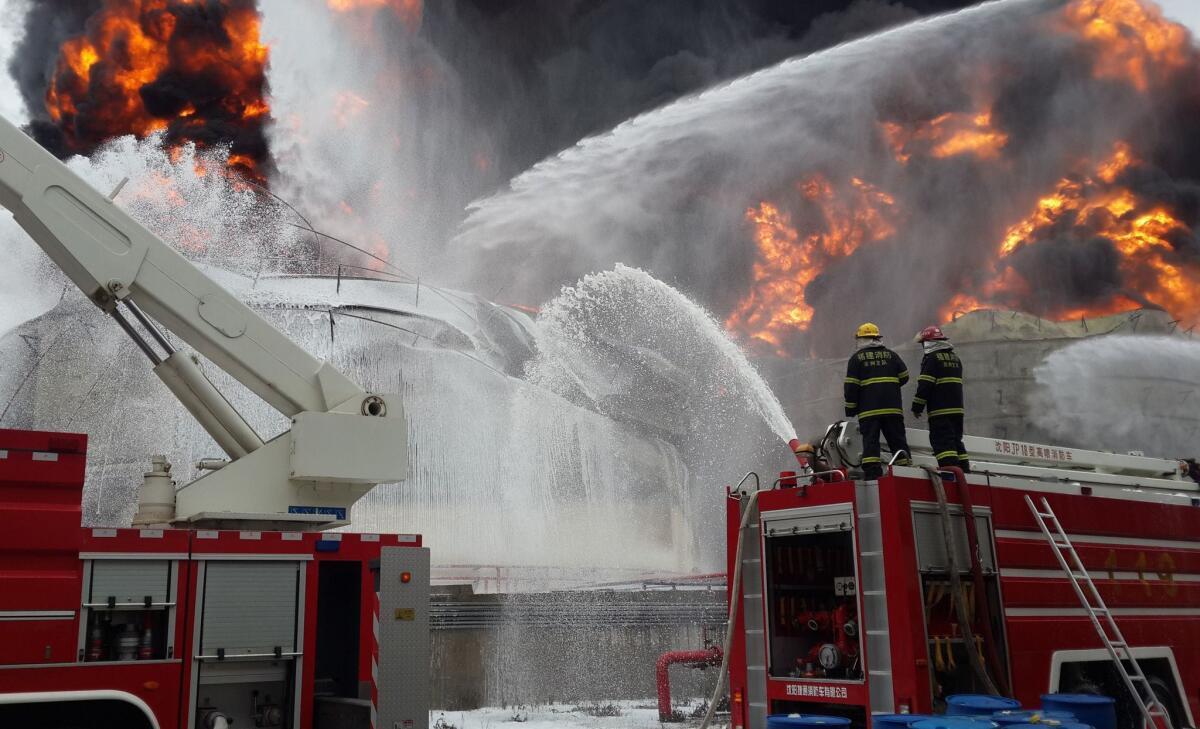Massive fire puts spotlight back on Chinese chemical plants

Firefighters battle a blaze following an explosion at a plant producing paraxylene - a chemical commonly known as PX - in Zhengzhou, in east China’s Fujian province, on April 8.
- Share via
Reporting from Beijing — A blaze at a chemical factory in southeastern China has put a fresh spotlight on the safety and management of such facilities and their potential environmental impact.
The fire broke out Monday at the Taiwanese-owned Tenglong Aromatic Hydrocarbon plant in the city of Zhangzhou in Fujian province, and defied the efforts of 829 firefighters and 170 fire engines to put it out over three days. At least six people were injured.
The blast could be felt miles away and shattered windows of homes and businesses in nearby villages; residents were evacuated as the inferno raged. Members of the army’s chemical defense corps were among firefighters who battled the blaze.
It was the second explosion in less than 20 months at the facility, which produces paraxylene, or PX, a substance used to make plastic bottles and synthetic fabrics. Acute short-term or accumulated long-term exposure can be harmful to the respiratory and nervous systems, among other effects, according to the U.S. Environmental Protection Agency.
According to the state-run New China News Agency, oil leaked from the facility and caught fire, leading to blasts at three nearby oil storage tanks. The fire was extinguished but reignited Tuesday evening and blazed for four hours, according to the news agency. One tank caught fire early Wednesday morning.
Authorities said 50 environmental protection personnel had been dispatched to the site to monitor the situation and collect wastewater. “No excessive pollutants have been detected in three nearby villages,” New China News Agency said.
PX plants have been controversial in China, with protests erupting in numerous cities including Dalian and Maoming over plans to locate the factories in densely populated areas.
NEWSLETTER: Get the day’s top headlines from Times Editor Davan Maharaj >>
The Zhengzhou plant was initially slated to be built in the city of Xiamen, but widespread demonstrations in 2007 prompted the relocation of the facility to Zhengzhou.
“This just proves that the residents in Xiamen were very smart,” said Wen Yunchao, an activist now based in the U.S. who was involved with the Xiamen protests. “This is a sad situation for the residents in Zhangzhou.”
Ma Tianjie, program director for mainland China at Greenpeace East Asia, said while PX plants are, in general, not more or less dangerous than many other chemical factories, they have become the focus of national attention since the 2007 Xiamen protests.
Still, he noted that “two explosions in two years is pretty serious,” and adding that he was concerned about the possible contamination of groundwater in wake of the fire. The initial environmental impact assessment of the facility, he said, had warned of such problems if a major leak occurred.
“Right now there are no clear reports on whether there’s any leakage toward groundwater,” he said.
According to Ma, China has about 16 PX plants in operation with a production capacity of 10 million tons per year; the plant in Zhengzhou accounts for about 8% of China’s PX production.
China’s environmental minister urged during the country’s annual parliamentary session last month that construction of PX and other similar projects pass strong environmental impact assessments, the news agency said.
“This is a high agenda item for the new minister,” Ma said.
But such pre-construction assessments would have little impact on established facilities like the one in Zhengzhou.
Lin Boqiang, an energy economist at Xiamen University, said China still needs to impose stiffer penalties on factories that violate the law. “The main problem with China’s environmental protection enforcement is that the amount of punishment that can be issued … is too low,” he said.
While he called the frequent protests over PX plants “a bit excessive,” he said such demonstrations are a result of the fact that citizens have very limited options for expressing their concerns.
“They can’t really sue a company that runs a PX project that violated environmental protection laws,” said Lin. “If you look at the U.S., on top of supervision from government agencies, most of the companies are very scared of civil lawsuits filed by local residents whose life might be under impact of the projects these companies are involved in.”
Although China recently modified its laws to allow some public interest groups to launch environmental lawsuits against polluters, Wen said he believed the legal framework was still biased in favor of businesses.
“Any NGOs that dare to launch such lawsuits, the chances are greater that they will end up in jail rather than the real offender,” he scoffed.
While right now the initial focus of the fire investigation is safety violations, Ma said that if major pollution to groundwater were found, it would be a key test for environmental enforcement authorities.
The Global Times, a nationalist newspaper owned by the Communist Party, said in an editorial that this week’s fire must be “thoroughly and rigorously investigated” because the “public has a right to know” why the facility experienced two explosions in less than two years.
“The more transparently we handle the issue, the more likely we are to reassure the public,” the commentary added, saying “stricter program management and risk control mechanisms should be established.”
But the result, the paper concluded, needs to be the expansion of PX programs, not the dismantling of them.
Tommy Yang in The Times’ Beijing bureau contributed to this report.
Follow @JulieMakLAT for news from China
ALSO:
‘Mama, save me, I can’t bear it’: A firefighter’s cry in China’s inferno
Chinese firefighters paid high price in blasts that water may have triggered
Massive fire puts spotlight back on Chinese chemical plants
More to Read
Sign up for Essential California
The most important California stories and recommendations in your inbox every morning.
You may occasionally receive promotional content from the Los Angeles Times.










